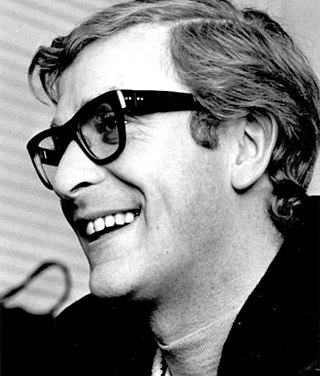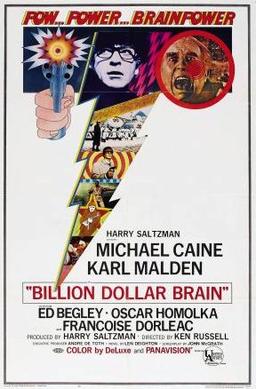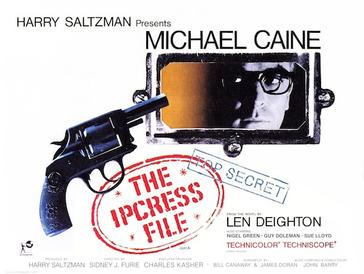Related Research Articles
The IPCRESS File is Len Deighton's first spy novel, published in 1962. The story involves Cold War brainwashing and includes scenes in Lebanon and on an atoll for a United States atomic weapon test, as well as information about Joe One, the Soviet Union's first atomic bomb. The story was made into a film in 1965 produced by Harry Saltzman, directed by Sidney J. Furie and starring Michael Caine; and a 2022 TV series, starring Joe Cole, Lucy Boynton and Tom Hollander.
Leonard Cyril Deighton is a British author. His publications have included cookery books and works on history, but he is best known for his spy novels.

Harry Palmer is the name given to the anti-hero protagonist of several films based on spy novels written by Len Deighton, in which the main character is an unnamed intelligence officer. For convenience, the novels are also often referred to as the "Harry Palmer" novels.
Funeral in Berlin is a 1964 spy novel by Len Deighton set between Saturday 5 October and Sunday 10 November 1963. It was the third of Deighton's novels about an unnamed British agent. It was preceded by The IPCRESS File (1962) and Horse Under Water (1963), and followed by Billion-Dollar Brain (1966).

Billion-Dollar Brain is a 1966 Cold War spy novel by Len Deighton. It was the fourth to feature an unnamed secret agent working for the British WOOC(P) intelligence agency. It follows The IPCRESS File (1962), Horse Under Water (1963), and Funeral in Berlin (1964). As in most of Deighton's novels, the plot of Billion Dollar Brain (1967) is intricate, with many dead ends.

Elizabeth David was a British cookery writer. In the mid-20th century she strongly influenced the revitalisation of home cookery in her native country and beyond with articles and books about European cuisines and traditional British dishes.

Billion Dollar Brain is a 1967 British espionage film directed by Ken Russell and based on the 1966 novel Billion-Dollar Brain by Len Deighton. The film features Michael Caine as secret agent Harry Palmer, the anti-hero protagonist. The "brain" of the title is a sophisticated computer with which an anti-communist organisation controls its worldwide anti-Soviet spy network.

Ruth Reichl is an American chef, food writer and editor. In addition to two decades as a food critic, mainly spent at the Los Angeles Times and The New York Times, Reichl has also written cookbooks, memoirs and a novel, and has been co-producer of PBS's Gourmet's Diary of a Foodie, culinary editor for the Modern Library, host of PBS's Gourmet's Adventures With Ruth, and editor-in-chief of Gourmet magazine. She has won six James Beard Foundation Awards.
Nigel Slater is an English food writer, journalist and broadcaster. He has written a column for The Observer Magazine for over a decade and is the principal writer for the Observer Food Monthly supplement. Prior to this, Slater was a food writer for Marie Claire for five years.
Sidney Joseph Furie is a Canadian film director, screenwriter, and producer known for his work in both British and American cinema between the 1960s and early 1980s. Like his contemporaries Norman Jewison and Ted Kotcheff, he was one of the earliest Canadian directors to achieve mainstream critical and financial success outside their native country at a time when its film industry was virtually nonexistent. He won a BAFTA Film Award and was nominated for a Palme d'Or for his work on the spy thriller The Ipcress File (1965) starring Michael Caine.

The Ipcress File is a 1965 British spy film directed by Sidney J. Furie, from a screenplay by Bill Canaway and James Doran, based on Len Deighton's 1962 novel The IPCRESS File. It stars Michael Caine as Harry Palmer, an agent for the Ministry of Defence investigating the disappearances of high-level scientists.
Raymond John Hawkey was an English graphic designer and author, based in London.

Bullet to Beijing is a 1995 made-for-television film that continues the adventures of the fictional spy Harry Palmer, who appeared in the 1960s films The Ipcress File, Funeral in Berlin and Billion Dollar Brain, based on books by author Len Deighton. Though an alternative title is Len Deighton's Bullet to Beijing, Deighton was not associated with the film.

Colonel H. L. Ross is a fictional character from the series of novels by Len Deighton variously described as the "Secret File" or "Unnamed hero" novels. His first names are not revealed.

Ambrose Heath was an English journalist and food writer. He authored many cookbooks.

A Book of Mediterranean Food was an influential cookery book written by Elizabeth David in 1950, her first, and published by John Lehmann. After years of rationing and wartime austerity, the book brought light and colour back to English cooking, with simple fresh ingredients, from David's experience of Mediterranean cooking while living in France, Italy and Greece. The book was illustrated by John Minton, and the chapters were introduced with quotations from famous writers.

Len Deighton's Action Cook Book is a 1965 collection of cookery strips originally published in the Observer newspaper, with additional information and notes. Aimed at "an audience of men unskilled at knowing their way around the kitchen", the book has been described as a cult classic from the period and helped pave the transition from cooking being only for women, into being a sophisticated expectation of a modern man.

The Cooks and Confectioners Dictionary: or, the Accomplish'd Housewives Companion was a cookery book written by John Nott and first published in London in 1723.
Len Deighton is an English author known for his novels, works of military history, screenplays and cookery writing. He has had a varied career, including as a pastry cook, waiter, co-editor of a magazine, teacher and air steward before writing his first novel in 1962: The IPCRESS File. He continued to produce what his biographer John Reilly considers "stylish, witty, well-crafted novels" in spy fiction, including three trilogies and a prequel featuring Bernard Samson.

The Ipcress File is a British cold war spy thriller television series loosely based on the 1962 novel The IPCRESS File by Len Deighton. Written by John Hodge and directed by James Watkins, it stars Joe Cole, Lucy Boynton and Tom Hollander. It was first broadcast at 9pm from Sunday 6 March to 10 April 2022 on ITV. The entire series was available for streaming, with commercials, on ITV Hub after episode 1 was broadcast. Within a week the full series was also available, commercial-free, on BritBox in the UK.
References
- 1 2 Stummer, Robin (14 Dec 2014). "Len Deighton's Observer cookstrips, Michael Caine and the 1960s". The Guardian.
- ↑ "A taste of the action: Len Deighton's cult Sixties' cookbook is back". The Independent. 18 June 2009.
- ↑ Deighton, Len (2009). Action cook book. London: Harper Perennial. ISBN 978-0-00-730587-2.
- ↑ Billson, Anne (15 Feb 2014). "Which foodie films make your mouth water?". The Telegraph.
- ↑ Deighton, Len (October 1965). Ou Est Le Garlic. London: Jonathan Cape. ISBN 978-0140461176.
- ↑ "Len Deighton's new cookstrips". The Guardian.